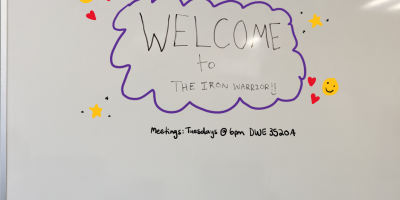Hi everyone, and welcome to Issue 3! The tragedy of midterms has finally passed, and hopefully by now many of you are starting to recover from your post-weekend hangovers.
I’d like to start first with an apology to Professor Bajcsy, who was featured in last issue’s Prof Personalities – we mentioned in the photo caption that he was currently completing his research in the United States. In fact, he was simply visiting the States last week. Sorry about that!
Besides midterms, though, these past couple of weeks have truly been tragic. It seems like people are getting shot left and right now – first the Youtuber and the Voice winner Christina Grimmie, then the 50 people in Orlando, then the British MP Jo Cox… And as we’d expect, the topic of gun control in America is being hotly debated like never before. When things like this happen, the National Rifle Association (NRA) and allies usually spend a lot of money making sure these debates about gun control just fizzle out of existence.
But I think this time there’s a hope something can be done. Stricter regulations on gun sales and more thorough background checks seem like they’re very close to being enacted (it’s a wonder that they haven’t been enacted already), and in the best case a full ban on civilian-owned automatic weapons would come into effect. And seriously, who really needs a fully or even semi-automatic weapon? If you believe in owning a gun because you want to defend yourself and your family, what kind of assailant merits owning an automatic weapon? The mafia? The KGB? And while it’s true that determined mass murderers will find ways to kill people without using automatic weapons, if we can reduce the number of mass shootings by even a little bit, then it’s a measure that we should take.
Anyway, I’ll leave the gun control debate for others to fight. This time, I think I’ll step away from social media as a topic and talk a little bit about music. I’m sure many of you have at least dabbled with playing a musical instrument before. Maybe you picked up an old guitar at a garage sale and figured you wanted to emulate your musical heroes. (Kudos to you if you bought a guitar because you got sick of playing the air guitar every time your favourite riff came on.) Or maybe you made a band with your friends in high school. Or perhaps your parents made you learn an instrument as a kid. Whatever the reason, learning an instrument is a great hobby to have.
This has me thinking, though – is it possible for anyone to become an excellent musician? Or for that matter, is it possible for anyone to pick up any skill they want? I personally believe that in theory, people should be able to learn any new skill and, given enough time and practice, they will become very good at it. But of course, being human, we don’t have an unlimited amount of time to learn skills, so if we want to learn as much as possible, we need to find ways to increase our learning efficiency.
As one could imagine, there are techniques we can use to learn new things faster. For instance, I’ve played classical piano for a while and one technique I use to great effect is splitting each piece into small chunks. Where the chunks are divided depends on whether those divisions make sense within the context of the piece (for example, ending a chunk in the middle of a bar doesn’t make a lot of sense). This division makes each chunk easy to memorize, and if a piece is especially difficult from a technical standpoint, separating each difficult part into a chunk allows me to focus on one challenging passage at a time. It’s also possible to practice each chunk using a different rhythm, which helps me learn faster because it forces me to think actively about the passage while I’m practicing. Then, when each chunk is memorized, I can work backwards and reconstruct the entire piece. One sure sign you’re doing a good job is if you can start from any chunk you want within the piece – this means that as you’re playing, you should be able to remember which section comes next and think about how you’re going to play it before you actually play it.
In a somewhat limited sense, this method can be applied to learning other skills as well. We already organize textbooks into sections so that the content and knowledge contained within them is more modular and easier to learn. What we can then do with each module is, for example, if there are certain applications listed in a textbook, we could imagine other applications where the knowledge could be used, or we could think of analogies for that knowledge. I find these techniques while studying are very helpful when it comes to staying focused.
How about for other hobbies, rather than school-related skills? Sometimes I find the hardest part of trying to learn something new is if I’m unable to draw those analogies to something I already know, or if I’m unable to “get a feel” for the new hobby, especially if the hobby is something I learn in my spare time. (Funny story – not getting a feel for the mechanics of the game “League of Legends” probably saved my grades in high school.) And this is where discipline and enjoying the new hobby come into play. Once we can get past that initial barrier to entry – usually by forcing ourselves to sit through the basics of learning the new hobby – we can begin to appreciate it and it becomes much more interesting. This means that applying more efficient learning techniques is most important during that phase where we’re just trying out the new skill, because it’ll make sure we’re able to overcome the barrier to entry more easily.
One more common perception about skills that I find a bit silly is the idea that just because people do a certain profession or are studying a certain thing in school, they can only learn skills that are somewhat related to that domain of knowledge. For instance, we’d probably expect engineering students to have hobbies such as programming or building circuits, but it’s ridiculous to expect every engineering student to have only hobbies related to engineering. Case in point: all the writers here at the Iron Warrior. There are plenty of engineering students who also love arts, and history, and philosophy – things you wouldn’t typically associate with engineering.
One of the most hopeful things to think about, when it comes to learning skills that are thought of as opposites (such as science and arts), is that we can become extremely good in skills from entirely “opposite” regions of knowledge. Blaise Pascal was a 16th century mathematician and philosopher. Arnold Schwarzenegger was a weightlifter, a movie star, and a Governator. The famed comedian Rowan Atkinson has his Masters’ in Electrical Engineering. So whatever your hobby, just go out and do it, and do it well – but be sure to never stop learning!




Leave a Reply